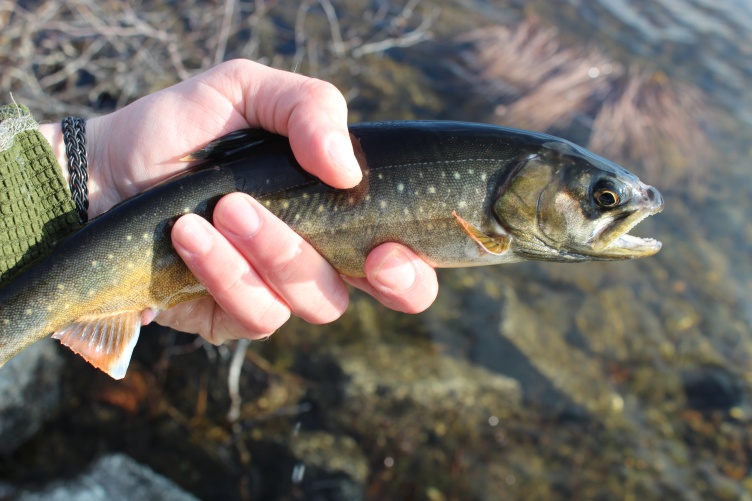
Arctic charr make Maine lakes their southern-most home, putting them at risk for effects of climate change. Photo by Bradley Erdman.

Arctic charr, true to its name, is a cold-water fish that makes its southern-most home in Maine lakes, putting it at particular risk for the effects of climate change. Indeed, in the past century, the highly valued fish went extinct from the Vermont and New Hampshire lakes it colonized after glaciers receded 10,000 years ago.
With a new $1.5 million National Science Foundation grant, researchers at UNH and the University of Maine will study how the diversity and evolution of Maine Arctic charr feeding habits could affect their resilience or vulnerability to climate change. Their work could help scientists better predict the viability of Maine Arctic charr and other species with populations that are at the edge of their ecological ranges.
“Arctic charr are of extreme conservation importance, but studying this species in Maine will also help the conservation and management of other fish species who are at the warm edge of their range.”
“Arctic charr are of extreme conservation importance, but studying this species in Maine will also help the conservation and management of other fish species who are at the warm edge of their range,” says Nathan Furey, an assistant professor of biological sciences at UNH, who will spearhead the study in collaboration with Michael Kinnison, a UMaine professor of evolutionary applications and UNH alumnus, and Christina Murphy, an assistant professor with the UMaine Department of Wildlife, Fisheries and Conservation Biology and assistant unit leader of Maine’s U.S. Geological Survey Cooperative Fish and Wildlife Research Unit.
“Many of Maine’s iconic species, from moose, to loons, to salmon and Arctic charr are literally living on the edge … their warm range edge, says Kinnison, who directs the Maine Center for Genetics in the Environment and whose lab has collected more than two decades of Arctic charr genetic samples and data from Floods Pond in Otis, Maine. “We think the winners and losers will often come down to which populations can adapt or otherwise match climate-related resource changes. Maine’s Arctic charr are a good system to study this theory and a possibly unique one given our 20-year dataset of fish captures, traits and genetic samples.”
A postdoctoral researcher, two graduate students, multiple undergraduate students and technical staff will work with Furey, Kinnison and Murphy on the project. The team also will partner with Laura Wilson, a University of Maine Cooperative Extension 4-H science youth development professional (and UNH alumna), to create science toolkits based on their Arctic charr research that will teach grade school students about how aquatic species endure, or perish from, different effects of climate change.
“We are really excited about this project because of the multifaceted expertise of the group,” Furey says. “Our interdisciplinary approach will not only advance the science, but it will be a benefit to the involved students and early career researchers who will gain skills and experience across a breadth of biological disciplines.”
Marcus Wolf of the University of Maine contributed to this story.
-
Written By:
Beth Potier | UNH Marketing | beth.potier@unh.edu | 2-1566



















































